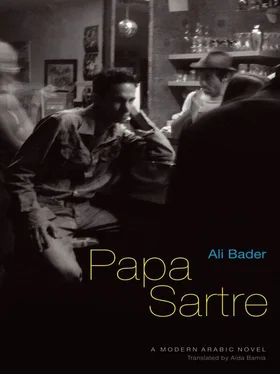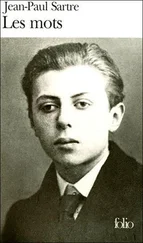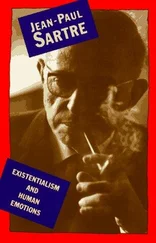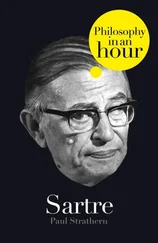After he went to London, where he chose to live, the Khaddouris were at the mercy of Abboud ibn Nazira, a harsh man who had plucked out the beard of the comic journalist Ibrahim Saleh Shukr because of a feuilleton he wrote that made fun of the government. They could not work in the atmosphere of imaginary plots he created and decided to leave. They went to Mahallet Qunbur Ali and rented a store and a small workshop, where they made rattan chairs.
Their pitiful financial state was obvious, and only through gargantuan efforts could they improve their lot. They worked day and night, and the situation slowly improved. After two years, owing to good work and trade ethics, they had achieved an acceptable financial status. The signs of wealth were apparent in their lives, and a number of posh shops opened around them, selling sweets, clothes, jewelry, shoes, and furniture. The most dramatic change happened after a deal they made with the business man Rick Dowell, a former British soldier in the first cavalry regiment that was led by Sir Frederick Maude, which entered Baghdad after the First World War.
66
Rick Dowell crossed the span that was later named Maude Bridge with the Sikh, Karka, and Gurkha soldiers occupying Baghdad in 1917, then proceeded to the palace in Mahallet Jadid Hasan Basha. He participated in the review of the British Army on al-Rashid Street, as can be seen in the one existing photograph of the event. Rick spent five years in Baghdad and did not return to London until the British troops withdrew, in the nineteen-twenties.
Rick returned to Baghdad after the Second World War to place flowers on the tombs of his friends, who were killed during the war of occupation, fighting against the Ottoman soldiers led by Khalil Pasha. He also visited the soldiers who were buried in the British cemetery near Bab al-Muadham. Elias and Faraj offered the ex-invader a beautiful chair made of the best rattan. This expression of generosity along with the wonderful welcome he received moved him to tears; he decided to sign a contract to export the finest of those oriental chairs upholstered with rugs to be sold in the Marks & Spencer store in London. The deal transformed the small atelier into a huge company with colored lighted billboards reading: “Khaddouri Company for the Export of Rattan Chairs.”
Faraj and Elias were invited to exclusive parties with select guests. They became good friends with the Lawi family who owned car agencies on al-Rashid Street. Every Friday evening they went to parties organized by Sassoon Lawi. It was at one of those parties that Faraj fell in love with Elain Ifrayem, the most beautiful Jewess of her time.
67
Elain had a fair, youthful complexion very much like that of an Italian woman. She would move among reception guests with a cheerful face, wearing a white sleeveless blouse and short skirt. She exuded calm and joy. Faraj watched her while spreading butter on bread, feeling her presence immanently, letting his imagination run over her, and inhaling her scent whenever she came close. She melted at the slightest compliment or praise. She stood before him, neck straight, the contours of her chest visible under her well tailored clothes. The whole atmosphere of the illuminated reception hall and its warmth during the cold winter evenings augmented his awareness of Elain’s femininity.
Elain was in love with Robin Assaf, who worked in the Guri medical supply depot. The Guri and Lawi families were enemies. Elain’s family also considered Robin an adversary because he worked in their enemy’s headquarters. They couldn’t destroy or even harm Robin financially because he was already penniless, so they decided to ruin him socially, a strategy no one expected.
The elder Ifrayem, an accountant, knew that a person’s worth was measured by the amount of money he possessed, which explains why he scratched Robin from the list of eligible suitors for Elain. Faraj was also an inappropriate match due to his religion. It was at that time that one of the sleaziest persons in Jewish circles, Mayer ben Nassim, the Lawi family accountant, appeared on the scene. Faraj Khaddouri paid Mayer a visit in his office to seek his help in his amorous schemes.
68
The office was filthy. Pistachio shells and cigarette butts cluttered the floor, and the place was disgusting. Mayer wore worn-out black clothes, the buttons were gone from his vest, his rugged wool shirt was stained with coffee, and his necktie was torn.
At the end of their long conversation Faraj was surprised to hear Mayer declare that there was an easy solution, “a simple trick.”
“Yes my friend. It’s easy,” said Mayer, laughing. His face was fair and thin, his nose long, and his black eyes almost round. Smoothing his greasy hair with his hand, he explained his idea to Faraj. “Just give me a photograph, and I’ll give you a fake Jewish birth certificate. It’s easy my friend, very easy.”
One of Butrus Samhiri’s documents bore this description: “Mayer ben Nassim is a malicious Jew, a usurer, degenerate, and coward.” The Lawi family and Mayer ben Nassim convinced Ifrayem that Faraj Khaddouri was a closet Jew. Faraj gave Ifrayem a lot of money for Elain’s sake. He was willing to do anything to win Elain.
This is how the Lawi family was able to destroy their enemy socially. They humiliated and insulted him and forced him to run away to America a few days before Elain’s wedding.
69
Elain converted to Christianity. The procession after her church wedding was led by a Chevrolet, a wedding gift from the Lawi family to Faraj, a down payment for his friendship and the price of his silence.
The procession of the newlyweds, preceded by gold-plated carriages, moved through al-Rashid Street, from the Plazia Restaurant to the Europe Palace Hotel on the Tigris River, where the newlyweds were spending one night before honeymooning in Venice, Rome, and Milan. Faraj enjoyed his wife’s fair body under the Adriatic sun and returned home drunk with happiness.
70
The major change for the Khaddouri family was the location of their new house. They — Faraj and Elain, Elias and his wife Paulina, and their daughter Nadia — moved to al-Maarif Street, near the Armenian church.
The Khaddouri family chose to live in the outskirts of the city near the white palace where the king occasionally spent time. They built a large mansion, quite tall, surrounded by an impressive fence that separated it from the meadows and grazing animals. A huge garden featuring a fountain with a striped mosaic pattern facing the entrance of the house was the family’s favorite gathering place in the evenings. The men smoked water pipes and the women happily sipped coffee with cardamom from porcelain cups.
Nadia changed as she made the transition from childhood to adolescence. Her expressions revealed a maturing young woman quite different from the capricious child she has been. She became kind and rather timid. In summer she slept until noon, and then went down to the garden, where her friends would join her. Sometimes she would ride in her father’s car across the endless barley and lettuce fields. In winter she’d usually choose to stay home, near the fire, and feed it continuously. Occasionally she would visit Mayer’s office, whose influence over her father was growing. He usually drove her back home or, with her father’s approval, took her to the Plazia Restaurant for dinner. He had a permanent office room in the Khaddouri family business.
Nadia tried to emulate her father’s goodheartedness and her mother’s kindness and compassion. She wasn’t gifted, but she was sensitive. She likely inherited her sensitivity from her father, and it is probably the only virtue she never lost.
Every day Nadia went to her father’s company accompanied by the driver or Mayer ben Nassim. She often persuaded her father to have dinner with her at the Plazia Restaurant. Nadia usually chose a table near a window that looked out onto the street and would watch the passersby. She tried to be witty and entertaining, and when she grew tired of laughing she’d get up. Her father and Mayer would follow.
Читать дальше












